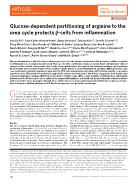Featured Publications
Glucose-dependent partitioning of arginine to the urea cycle protects beta cells from inflammation
Nature Metabolism: May 2020

Glucose/sugar is a pivotal nutrient with beneficial and damaging effects in the context of diabetes. In this paper, we investigated how the molecular breakdown of glucose influences the human pancreatic beta cell’s response to inflammation. Using metabolomic, biochemical and functional analyses, we found that glucose metabolism augments anaplerotic input into the urea cycle and protects beta cells from inflammatory cytotoxicity. These studies uncover a previously unappreciated link between glucose metabolism and arginine-utilizing pathways driven by the TCA cycle as a protective mechanism in diabetes. This article was featured in A BAD portion of glucose can be good for inflamed beta-cells
Glucose metabolism and pyruvate carboxylase enhance glutathione synthesis and restrict oxidative stress in pancreatic islets
 Pancreatic beta cell function to secrete insulin is impaired in diabetes due to a number of stress paradigms. In this paper, we investigate the metabolic mechanisms that underlie the response to inflammation and oxidative stress and identified a glucose-fueled route to de novo glutathione synthesis in via the TCA cycle enzyme, pyruvate carboxylase (PC). PC is necessary and sufficient to mediate the metabolic input from glucose into glutathione synthesis and the oxidative stress response in beta cells.
Pancreatic beta cell function to secrete insulin is impaired in diabetes due to a number of stress paradigms. In this paper, we investigate the metabolic mechanisms that underlie the response to inflammation and oxidative stress and identified a glucose-fueled route to de novo glutathione synthesis in via the TCA cycle enzyme, pyruvate carboxylase (PC). PC is necessary and sufficient to mediate the metabolic input from glucose into glutathione synthesis and the oxidative stress response in beta cells.